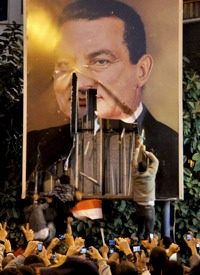
Fox News reports:
Tens of thousands of anti-government protestors poured into the streets of Egypt Friday, stoning and confronting police who fired back with rubber bullets and tear gas in the most violent and chaotic scenes yet in the challenge to President Hosni Mubarak’s 30-year rule. One protestor was killed and even a Nobel Peace laureate was placed under house arrest after joining demonstrations.
Protestors violated a ban on any gatherings in Cairo and marched to venues and major squares to demonstrate, where they shouted things such as “out, out, out,” and burned tires.
Local officials say there were protests in at least 11 of the Egypt’s 28 provinces, prompted by anger over alleged government neglect of poverty, unemployment, and rising food prices.
Likewise, protestors were reportedly “energized” by the return of Nobel Peace Prize laureate Mohamed ElBaradei, Egypt’s leading pro-democracy advocate, who had been traveling abroad for nearly a month. He declares that he is prepared to lead Egypt to a regime change.
The protests were endorsed by the Islamic fundamentalist group Muslim Brotherhood, an organization outlawed since 1954 because of its efforts to establish an Islamic state. Since the 1970s, the group claims to have denounced violence and become a peaceful movement.
In the 2005 elections, the Muslim Brotherhood managed to acquire 20 percent of the legislative seats, but failed to win a single seat in the election late last year. Most observers believe the vote was rigged in order to ensure that Mubarak’s ruling party won a heavy majority of the seats.
A Facebook page run by the protestors lists a number of their demands, including the dissolution of the parliament’s hold on new elections and the release of prisoners who have been jailed for years without charge or trial.
In response to the violence, the government instituted a 6 p.m. to 7 a.m. curfew in Cairo and two other cities. Likewise, Internet and cellphone services in Cairo were cut off as a means to hamper the organizing of further protests. Authorities have been disrupting service on social networking sites all week as well. In some areas of the country, service has been restored. Egyptians outside of the country have been posting updates on Twitter after receiving information via telephone from people inside the country.
The government’s efforts failed to prevent tens of thousands of Egyptians from protesting, however. Police responded to the outbursts by firing tear gas on the crowds, with some of the tear gas canisters setting several cars ablaze.
Residents watching the protests from their balconies and windows tossed cans of soda and bottles of water to protestors to clean their eyes and throats, as well as onions and lemons to sniff, to alleviate the sting from the tear gas.
Protestor Amal Ahmed, 22, insisted, “It’s time for this government to change. I want a better future for me and my family when I get married.”
Ahmed Sharif, a 21-year-old supporter of ElBardei, declared, “We are the ones who will bring change. If we do nothing, things will get worse. Change must come.”
According to Fox News, video of the riot was wild. “Television footage showed a chaotic and violent scene where protestors were throwing rocks down on police from a highway overpass near Tahrir Square, while a police vehicle sped through the crowd spraying tear gas on demonstrators.”
Since the start of the protests, Mubarak has not been seen or heard. He has not yet indicated whether he will seek another six-year term as President, but he is thought to be grooming his son for possible succession, though steadfast opposition remains against Mubarak’s heir, including from Eqypt’s military.
The Egyptian government has not alluded to the possibility of conceding to any of the protestors’ demands, though a number of options remain for the regime, reports Fox News:
The alternative is to introduce a package of political and economic reforms that would end [Mubarak’s] monopoly on power and ensure that the economic liberalization policies engineered by his son and heir apparent Gamal over the past decade benefit the country’s poor majority.
He could also lift the emergency laws in force since 1981, loosen restrictions on the formation of political parties and publicly state whether he will stand for another six-year term in elections this year.
Whether Mubarak would consider any of those options remains to be seen.
However, what is certain is that the violence in Egypt is yet another example of what happens when oppressive regimes run amok. Since liberty is a God-given right, it violates human nature to be subject to tyranny. As President Dwight Eisenhower once said, “Freedom has its life in the hearts, the actions, and the spirt of men and so it must be daily earned and refreshed — else like a flower cut from its life-giving roots, it will wither and die.”
Perhaps the progressives vying for greater control over the American people should look to nations such as Egypt to understand why individual freedom is a far better alternative.
Photo of protestors tearing a poster of President Mubarak: AP Images




